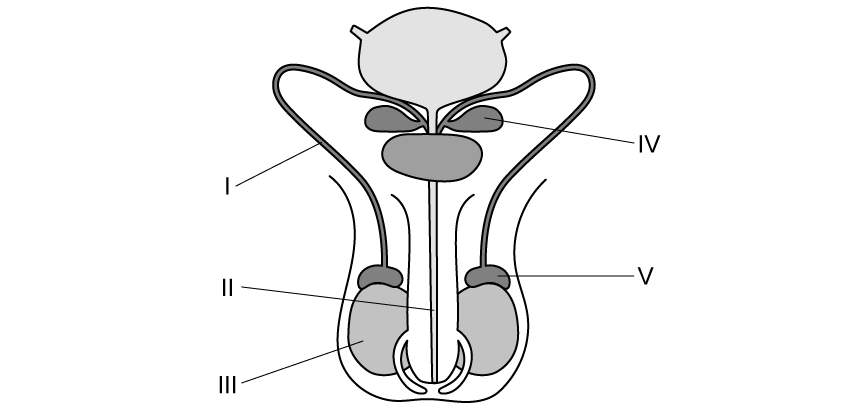Question 1
Which of the following cells in the pancreas secrete insulin?
Alpha cells
Beta cells
Exocrine cells
All of the above
Which of the following cells in the pancreas secrete insulin?
Alpha cells
Beta cells
Exocrine cells
All of the above
Which of the following statements (I - IV) correctly describe Type I diabetes?
I. It usually develops in those aged 40 and over, however more and more young people are developing the condition.
II. It is a condition in which the pancreas fails to produce sufficient insulin to control blood glucose levels.
III. It is normally treated with regular blood tests to check glucose levels, insulin injections, and a diabetes-appropriate diet.
IV. It is more common than Type II diabetes.
II and III
II, III and IV
I, III and IV
I and II
The diagram below shows the male reproductive system.
Which row correctly identifies the structures?
| I | II | III | IV | V | |
| A. | Urethra | Sperm duct | Testis | Epididymis | Seminal vesicle |
| B. | Seminal vesicle | Penis | Scrotum | Bladder | Testis |
| C. | Sperm duct | Urethra | Seminal vesicle | Epididymis | Testis |
| D. | Sperm duct | Urethra | Testis | Seminal vesicle | Epididymis |
During which phase of the menstrual cycle does menstruation occur (approximately)?
Days 1 - 7
Days 7 - 14
Days 14 - 21
Days 21 - 28
The peak in luteinising hormone (LH) during the menstrual cycle lead to which of the following events?
Stimulates the development of several immature egg cells in follicles in the ovary.
Stimulates the secretion of oestrogen by the follicle wall.
Stimulates the release of an egg into the oviduct.
Stimulates the endometrium to start thickening and the egg cell to mature.